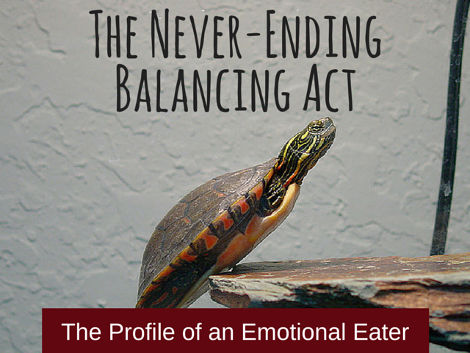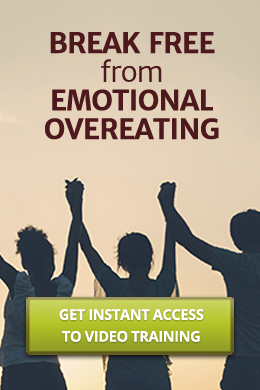There’s a certain type of person who is more prone to overeat for emotional reasons. I’ve learned it through personal experience– and through almost 20 years of working one-on-one with emotional eaters. See if you fit the profile of an emotional eater….
Clients always ask me: “Why do I battle with food this way? What causes it?”
And as someone who spent years asking that question, I know what the real question they’re asking is: “Why me?“ And so it can actually be freeing to realize that one’s personality makes it easier to turn to food for comfort, for reward, or for other emotional reasons.
So here’s what I’ve found among the 10,000+ people I’ve helped conquer emotional overeating– a few key personality patterns that are consistent among emotional eaters. I find that people who are proactive, result driven, and committed to doing their best at whatever they are working on tend to turn to food when things aren’t working out the way they had hoped for.
The Profile of an Emotional Eater
Let me paint you a picture of what this looks like in our work-lives:
A tight deadline at work is fast approaching, and you’ve got a boss that is constantly pushing and seems unappreciative of the work you do. Maybe there’s the added stress of a conflict with coworkers. Bottom line: it’s that sick feeling of not being good enough or always needing to do more. And when it sets in, you need something to turn to.
We see the same things with stay-at-home moms. See if this sounds familiar:
You’re trying to raise four kids and your life is a constant balancing act— getting the kids to do what they’re supposed to do, keeping up with the endless (and thankless) tasks that need to get done around the house, and everyone always asking about the next thing to be done. I’ve been there and I know: There is no natural beginning or end to a mom’s day. There is always another emergency, challenge, or fire that needs to get put out.
Why We Turn to the Food
Regardless of what our challenges are, if they don’t work out the way we had hoped or the way someone else had expected, it always ends up being our fault. We have this built-in need to be perfect, to do the very best we can. And that sets up unrealistic, unreachable expectations as we end up sacrificing ourselves to accomplish tasks.
And here’s where the emotional eating comes in: These emotions of pressure, stress, and disappointment drive us to the food. We feel angry, frustrated, or overwhelmed and end up turning to the food to block out or shut down uncomfortable thoughts or feelings. In case you’re wondering, that’s the very essence of emotional eating.
When we can’t get things the way we want, and we can’t accept them, we end up wanting to shut down from these uncomfortable thoughts and emotions. People turn to all sorts of different mechanisms to shut down those emotions: food, alcohol, rage, shopping, nail biting, cutting; the list goes on and on.
What we want to do is learn how to process our emotions. Recognize that we can only do the best that we can do and that’s all we can ask of ourselves. Beating ourselves up emotionally or working until complete exhaustion, never leaving time for ourselves, is what is setting us up to end up turning to the food. If we can change that process, we can stop the habit of eating emotionally.
My Personal Path to Healing
When I was trapped in my battle with emotional eating, I was obsessed with my weight, my grades in school, and the feeling that I didn’t have any control in my life. When I got frustrated or over-stressed, instead of dealing with those emotions in a healthy way, I realized I would just shift obsessions. I was able to stop driving myself crazy about one thing by driving myself crazy about another.
Obviously not a sustainable solution to my life’s problems.
What effect did this obsessive energy have in my life? It would allow me to shut down from uncomfortable feelings and thoughts and to hone in on food or my weight, and I wouldn’t have to focus temporarily on the pain I felt about what I didn’t know how to fix or make right.
But when I finally let go of the need to be perfect, and focused on doing the best I can, letting go of my stress and need for control and then detaching from the results, I fared much better. I was a new woman!
I was still bringing my “A game”, but I didn’t feel bad about myself as a person because things didn’t work out the I wanted them to on my time-frame. I learned to let things go when I realized I wasn’t in control of a situation, and this HUGE discovery set me free to do my best but not beat myself up as a human being.
I began to like myself and appreciate all that I accomplish. It also left room for things to work out and for me to think through things more clearly.
And that’s why most diets don’t truly work.
If you’re like I was in my battle with emotional eating, the way you obsess about food is just a symptom of a deeper problem: you need to train yourself to respond positively to life’s challenges. Now, it’s super-important to treat symptoms– that’s why our Hungry Heart Program includes so much practical knowledge-building about how to cultivate healthy food decisions. But it’s also critical that you address the real reasons you’re overeating in the first place! And a simple change in your diet will not help with that.








